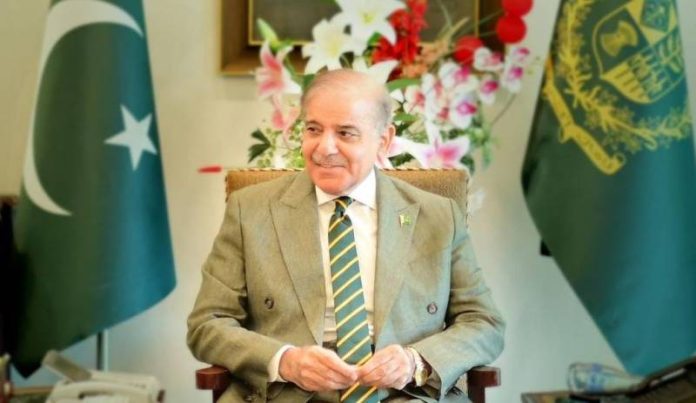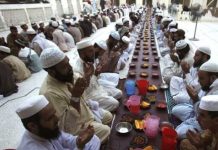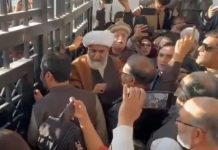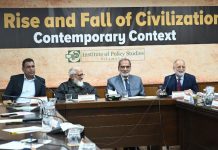Mian Muhammad Shehbaz Sharif has been elected the 24th prime minister of Pakistan after getting 201 votes. Sharif’s dynamic and exuberant political career sprawls around four decades with a limelight effect. Before being PM two times, he remained as Leader of Opposition in the Pakistan National Assembly. Shehbaz, a cancer survivor, proved a pivotal character in pushing the opposition to topple Khan’s government.
The 71-year-old politician is known for his remarkable administrative skills, political wisdom, aesthetic taste, witty dialogues and diplomacy in country’s affluent political circles. He has been in various daunting and challenging political journey since his start as young political worker till chairing the party as the President of Pakistan Muslim League-Nawaz (PML-N).
In public circles, he is known as a “tough administrator” who according to some analysts knows the “art to govern.”
Shehbaz Sharif
He was born on September 23, 1951 in a Punjabi-speaking Kashmiri family in Lahore. He is the younger brother of former three-time prime minister Nawaz Sharif. His father, Mian Muhammad Sharif, hailed from Kashmir’s Anantnag (Place in India) while his mother hailed from Pulwama. His parents migrated to Pakistan after the 1947 partition.
Going into reminiscence, the Sharif’s family sprawling residence located on the northern outskirts of Lahore is named after their ancestral village “Jati Umra” in Amritsar. Mian Mohammad Sharif was an upper middle class industrialist, started a steel business and set up a small factory on the outskirts of Lahore.
Regarding Shehbaz Sharif’s educational career, he got his early education from Saint Anthony’s High School in Lahore and later attended the prestigious Government College University in the same city to earn a degree of Bachelor of Arts. He got admission in Government College Lahore, from where he did his Masters in Economics.
He also joined his family business in the early 1970s along with elder brother Nawaz Sharif. He is an influential businessman and jointly owns the Ittefaq Group of Companies. In 1985, he was also elected president of the Lahore Chamber of Commerce and Industries. In 1970’s, Sharif brothers’ factories were taken into state control under a controversial nationalisation policy of former Prime Minister Zulfikar Ali Bhutto in 1974.
As stroke of good luck, they were returned in 1977 following the ouster of the Bhutto government through a military coup by the then-Army Chief Gen. Zia-ul-Haq.
Pertaining to matrimonial life, Shehbaz married three times. Currently, he has two wives but he has two sons and two daughters from Begum Nusrat Shehbaz whom he married to in 1973. His eldest son and political heir, Hamza Shahbaz, is currently serving as the opposition leader in the Punjab Assembly. He served Punjab province as chief minister for a while but could not hold his office after Court’s verdict against his unconstitutional Voting Process in Punjab Assembly.
Wrapping up Sharif’ brothers’ political journey, Shahbaz Sharif and Nawaz Sharif became the emerging stars of Pakistani politics in the early 1980s during dictatorship of Gen. Zia-ul-Haq. His elder brother, Mian Nawaz Sharif, was the first in the family to venture into politics and joined the provincial Cabinet as the youngest finance minister under the patronage of the then-Punjab Governor Gen. Ghulam Jilani.
Glancing back into his Parliamentary history, Mian Shehbaz Sharif was first elected to the Punjab Assembly in 1988 and to the National Assembly in 1990.He was again elected to the Punjab Assembly in 1993 and served as the opposition leader until 1996.With growing confidence and political exposure, he was elected as chief minister for the first time in 1997, but his government only lasted for slightly over two years as the then-Army Chief Gen. Pervez Musharraf toppled the Nawaz Sharif government in an unconstitutional and illegitimate military coup in October 1999.
Through a challenging political turmoil, the Sharif brothers were tried for hijacking a commercial airliner in which Nawaz was sentenced to life imprisonment in April 2000 for issuing orders. Adding, Shehbaz Sharif and two other accused in this case were acquitted. In 2001,the Sharif family, under an agreement brokered by former Saudi King Abdullah bin Abdul Aziz, went into exile in Jeddah, Saudi Arabia and lived there for six years.
The family returned to Pakistan in 2007, and Shehbaz Sharif got elected as Punjab chief minister for a second term in the 2008 general elections and completed his five-year term. In 2013, he was re-elected as chief minister for a third term and served until 2018. In 2018, he was elected as a member of the National Assembly and served as the opposition leader until 11th April 2022.
His political career envelops with glorious achievements. In 2017, he was chosen as the president of the Pakistan Muslim League (Nawaz) following the disqualification of Nawaz by the Supreme Court in the wake of the 2016 Panama Papers scandal. Since 2017, he has been serving as President of PML (N) the Party Head successfully.
As the chief minister of Punjab, he developed a reputation as an efficient administrator, particularly for his grip over bureaucracy. The critics unanimously opine that Shehbaz Sharif should be considered and acknowledged as the pioneer of today’s Lahore, one of Pakistan’s developed cities. He is particularly admired for the development of the communication and transportation system across the province, including in small and rural areas. No doubt, the Metro Bus projects, Safe City project, metro lines and a network of roads, overhead bridges and underpasses in Punjab are frequently touted as his landmark achievements as an efficient administrator.
During his CM-ship, development and progress of the province were appreciated by national and global media. Ghost schools were eliminated and IT sector and foreign investment was given warm welcome. Internationally, due to his good policies Microsoft and Oracle made a huge investment in Pakistan.
In recent years, Shahbaz Sharif’s sons faced several corruption cases. They, however, deny the charges and term the cases “political victimization.” As a matter of fact, Shehbaz Sahrif , who himself faced several corruption cases and served prison time for nearly two years during the previous government, had been on bail and no charge has so far been proved against him in the courts.

















